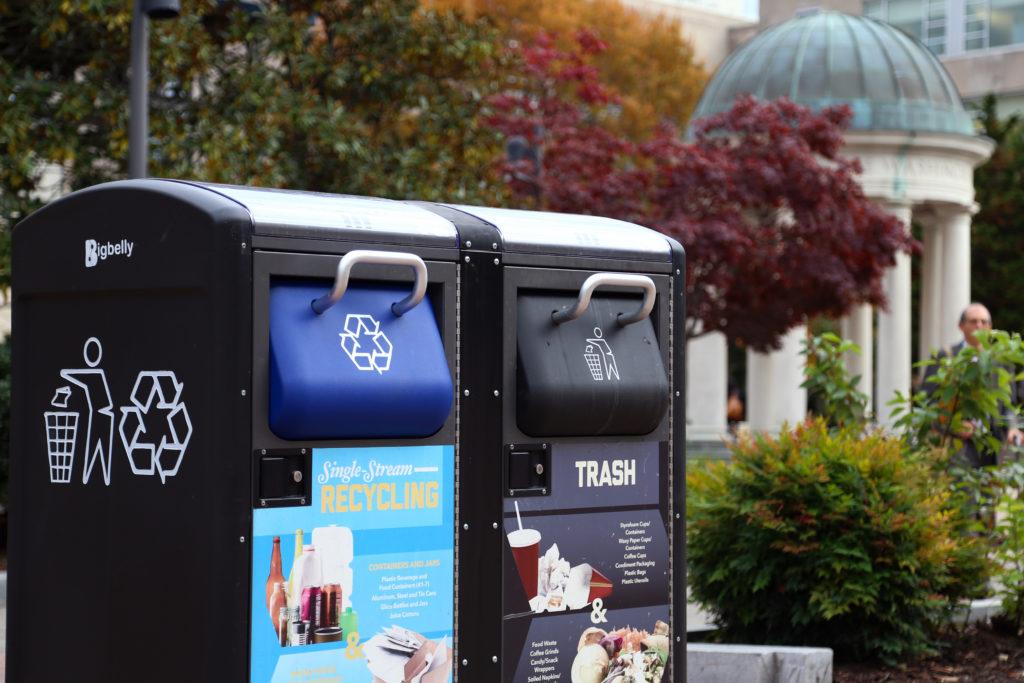A recent audit of GW’s recycling showed that food scraps are the most prevalent trash incorrectly placed in recycling bins.
Officials said the most recent waste audit last spring found beverage containers and paper are the most frequently recycled items on campus. Beverage containers are also one of the items that are most often incorrectly placed in trash bins when they could be recycled, along with plastic food containers, junk mail and paper inserts.
The audit program – which launched in 2014 – was slated to help GW cut campus waste by 50 percent over a three-year period.
University spokesman Tim Pierce said GW regularly conducts both independent and University-led audits of recycling efforts. Pierce said that based on the most recent audits – in conjunction with new recycling guidelines that were implemented in D.C. this year – the University redesigned signs on trash and recycling bins and are in the process of placing the new signs around campus.
“From increasing awareness about the need for and challenges associated with recycling to ensuring the University adheres to the increasingly stringent requirements for ‘clean’ recycling, audits are essential as we continue to progress toward fulfilling our recycling requirements,” Pierce said in an email.
Pierce said that if even a small number of contaminants are found in a load of recycling, it can result in the material being rejected or sent to the landfill. He said audits can help officials understand what the contamination levels are and where they originate, which can help GW create more effective ways of reducing contamination in recyclables.
Pierce said internal audits are conducted by staff and interns in the Division of Operations to “spot-check” how recycling is working in specific locations around campus. He said staff and interns also conduct public audits like the “recycle sort,” where bags of recycling are opened and sorted by students in Kogan Plaza to “highlight” the amount of non-recyclable items that end up in trash bins.
Pierce added that GW’s Sustainability Progress Report – which will be shared with the entire GW community – will be released this academic year and will include updates on sustainability goals like the University’s zero waste efforts.
Sustainability experts said frequent waste audits are the key to helping the University devise educational materials and advertisements that can encourage students, faculty and staff to recycle properly.
BJ Tipton, the manager of the office of waste reduction and recycling at University of North Carolina at Chapel Hill, said certain items that people often mistakenly recycle, like plastic bags and wires, are detrimental because they can get tangled up in machinery at recycling plants and shut down the process of breaking down recyclables.
Tipton said audits allow staff to use their findings to educate specific audiences, like students and faculty, about recycling. She said making the campus community aware of the results of the audit will help people understand how to recycle properly and gain a better understanding of how much can be done with recycled items.
“We really need for people to see the connection between what they put in the recycling bin and it getting made into something new,” she said. “It’s keeping it out of the landfill, that is fantastic, but even bigger is understanding that what they put in the recycling bin is somebody’s feedstock, or materials, for a new product.”
Sophie Rifkin, the senior associate director for the Center for Sustainable Business at New York University’s Stern School of Business, said following each audit, staff members need to ensure that educational messages are clear and compelling through proper signage. She said staff should review data from the audits several times each year because continued adjustments to educational messages are essential to achieving zero-waste goals.
“I think adding humor to it, adding really compelling visuals – there’s lots of different tools out there to shift the behavior change needed to get people to recycle in a more effective way,” she said.
Kikei Wong, the zero-waste coordinator at University of California, Los Angeles, said consistent audits help officials note campus-specific issues, and the information can then be used to set “community expectations.”
“People come from all over the world on to university campuses, each with their own background in recycling and waste, and each department operates differently, generating various materials,” Wong said in an email.





